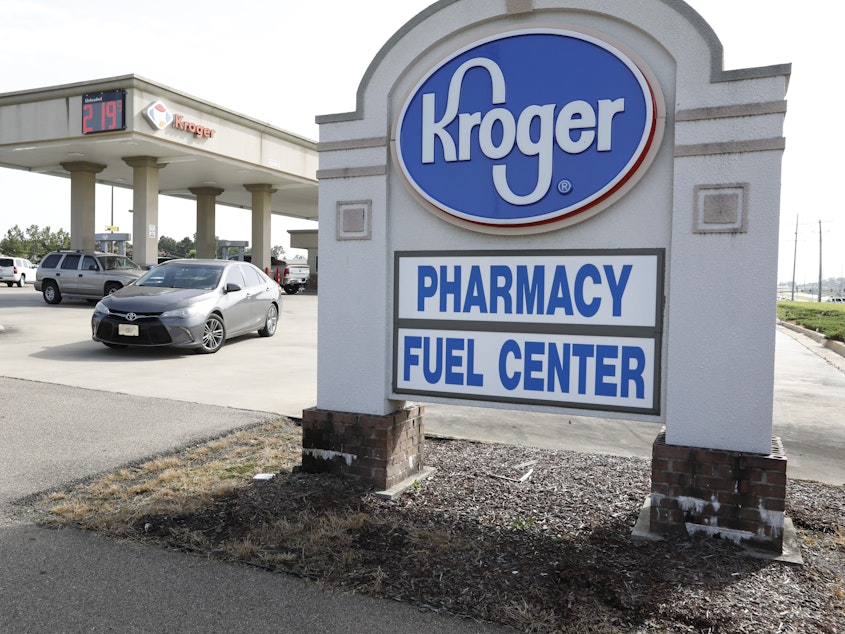Questions of competition highlight legal battle over proposed Kroger Albertsons merger

The trial in the merger of Kroger and Albertsons has wrapped up after three weeks of hearings in King County Superior Court.
Washington sued to block the nearly $25 billion deal, arguing it would reduce competition. Here are some key takeaways:
The state says Kroger and Albertsons are each other’s main competitors; the companies say Walmart and Costco are the ones to beat.
In closing arguments, Glenn Pomerantz, an attorney for the state noted, Kroger and Albertsons respond to each other whether it’s prices, store hours, or quality of products.
“Document after document showed… Kroger lowering its promotional prices to try to beat Albertsons every single week. And Albertsons doing the same thing in response," Pomerantz said. "In fact, your honor, as one person put it, it’s a dog fight every single week between these two companies.”
While the companies acknowledged they compete against each other, the grocery landscape has significantly changed. Consumers no longer shop at conventional supermarkets alone, but also at natural food stores, ethnic markets, even convenience stores. But the biggest threat, they say is coming from big box stores.
Sponsored
“Walmart is Kroger’s fiercest competitor,” said Mark Perry, a lawyer for Kroger. “Costco is Kroger’s second fiercest competitor, and Amazon and Target are nipping at their heels to be the next fiercest. [Kroger CEO Rodney McMullen] told you who he lays awake at night worrying about. It’s not Albertsons, your honor, it’s these well financed behemoths who are selling groceries combined by multiples than Kroger and Albertsons do now.”
Kroger and Albertsons are the two largest grocery companies in Washington state, with more than 300 stores that employ more than 25,000 workers throughout the state.
The companies announced plans to merge in October 2022, saying the consolidation is critical to their survival.
Questions about the divestiture
If the deal goes through, the companies will sell off 579 stores, including 124 in Washington state.
Sponsored
Jonathan Kravis, representing the state, raised doubts about the buyer, C&S Wholesale Grocers. The New Hampshire-based wholesaler operates two dozen stores, including Piggly Wiggly. Kravis raised doubts about C&S’s ability to restore the competition that would be lost because of the merger. He pointed to the wholesaler’s limited retail experience, and previous acquisitions.
“C&S’s strategy over the last two decades has been to buy stores and then flip them to their wholesale customers or close them altogether,” Kravis said.
Kravis noted that in 2021, C&S bought 12 divested Tops Stores in the Price Chopper merger and re-bannered them. Since then, he said sales dropped. C&S’s success as a wholesaler has not translated to success on the retail side.
But Enu Mainigi, a lawyer for Albertsons, said C&S’s retail operations would look different if the merger goes through. That’s because Albertsons’ current chief operating officer, Susan Morris, has been tapped to lead the divested stores.
“She is taking a senior leadership team with her who has worked with her for decades and has hundreds of years of experience between them,” Mainigi said. “These senior employees also have made multi-year commitments to C&S and have incentives tied to staying at C&S and seeing it succeed.”
Sponsored
Mainigi told the court that only half of the stores C&S is getting in Washington will be re-bannered to QFC or Haggen—brands that have a history here and are familiar to shoppers.
The future of the industry, without a merger
Even if the merger doesn’t happen, change is still a possibility. Mainigi told the court Albertsons will have to explore other options.
“It will need to consider layoffs, it will need to consider store closures," Mainigi said. "It will need to consider whether it has to exit some of the markets it’s currently serving.”




